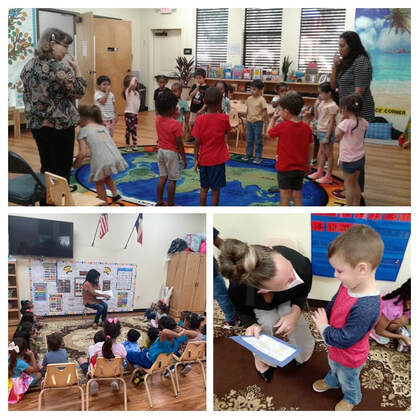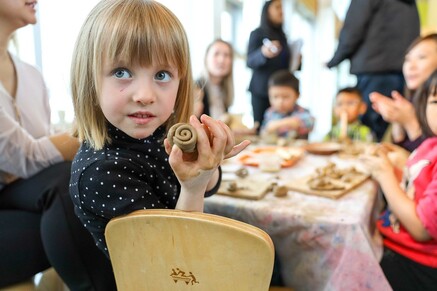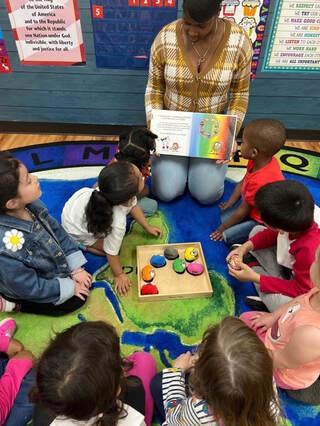|
It is challenging to say "No" to a preschooler without a meltdown. But this is an essential part of child’s learning and self-development. The teacher or the mentor has to be careful while dealing with the children in a Montessori school. Following are some tips which can help you handle a situation effectively.
Be firm but kind:. While setting the limits, you have to be firm and kind in an understanding manner. It makes the child feel respected and validated. Use clear language: You need to use simple and clear language with the child while saying "No" to a certain thing. Try not to use the words that are vague and confusing for the child. Give a reason: While saying "No," you have to explain the child why he is not supposed to do certain things so he understands that he is not being controlled but is being protected. Offer alternatives: When you say "No" to the child, offer an alternative activity to him so that he can satisfy his needs with an alternative that is being offered to him. Use positive reinforcement: When the child does not show any meltdown and accepts your "No," then you should reinforce his behavior with positive words and actions. Be consistent: You have to be consistent when it comes to setting the limits with the Montessori preschoolers. All the children have to follow the same rules and regulations and should not be changed for any child even if he insists or has a meltdown. Be consistent with setting rules and boundaries. Give choices: When you say "No" to a child, you should give the child two acceptable options to choose from. When he will choose an option, he will be satisfied and will feel empowered and you can meet your expectations as well. Avoid arguments: Stay away from the debates and arguments with the kid. The arguments and debates make the situation difficult. State your points very clearly to explain the child why certain things are unacceptable. Stay calm: You have to stay calm when a child is throwing a tantrum. If you react in the same way, the situation will get worse. Staying calm yourself will help you use different tips and approaches to make the child calm and handle the situation appropriately. By following these tips, you can help preschoolers learn how to handle disappointments and respect limits while avoiding meltdowns. Remember that every child is different, and what works for one may not work for another. Visit us at Blossoms Montessori School Preschool Childcare Daycare in Spring Texas https://www.blossomsmontessorischool.com
0 Comments
False Fatigue
Let us first understand the phenomenon of false fatigue. False fatigue is a term used for the work cycle in which the focus is lost. It happens after an interval of working hours. With the passage of each minute, the classroom might get louder, and you will notice the kids are getting distracted from their work. In Montessori Childcare, the teachers completely understand the meaning of false fatigue. They notice how children enter the class, their interaction with other kids and the class environment. They greet each other and start settling down. They start their work from the familiar task, which is comparatively easier for them than other tasks. Why Does False Fatigue Occur? In the work cycle, the first third part of the cycle is where kids are most engaged because they are fresh and can perform the task easily, but after an hour, their attention divides because of boredom and fatigue. The work they were taking an interest in seemed tedious to them now. The children being distracted from their work does not mean they need adult assistance and direction from them. All they require in false fatigue is space and time for self-direction. When the kid has time to himself, he can utilize that time by going out of the class, drinking water, going to the restroom, or simply taking a break. During that time, he can gain the energy to work again. Now he will be paying more attention to the task he craved intellectually. How can false fatigue be managed? While in Montessori Childcare, when the period of false fatigue strikes, the first thing to do is to put your trust in the children, do not assume that they might not be able to perform their tasks with concentration if they take their minds off of the task that they are performing. After taking a break from their work cycle, the children actually focus longer. The teachers need to put their trust in their children as letting them work through the false fatigue will help them learn how to expand their attention span, develop self-reliance and work with determination. It is suggested not to interfere with this natural phenomenon of false fatigue. Let the children find their way through this fatigue by taking the help of the Montessori Daycare environment set by you. Visit us at Blossoms Montessori School Preschool Childcare Daycare in Spring Texas https://www.blossomsmontessorischool.com Sensitive Period When we hear the phrase sensitive period, it often gives rise to a thought about moody teenagers. Still, the term sensitive period refers to that time period of a child in which his interest is focused on developing a definite skill and a certain knowledge area. The sensitive period is a period of interest in creative activities and a transitory state. In sensitive periods, there are different physical attitudes of children can be seen. The kids enjoy exploring their environment without facing any kind of boredom. It is an intense and prolonged period in which the kids do not experience any kind of fatigue. In Montessori Childcare, teachers are well aware of this transitory age of the kids, and they should be aware of what to do and how to deal with the kids during this period. When does a sensitive period occur? The Sensitive Period occurs between birth and the age of six. In the six years of their life, children go through five main categories, which include order, language, sensory skills, movement, and social skills. The sensitive period does not persist for long, and this period is temporary. Once the children complete that particular stage, the sensitive period fades away. This period cannot be relived. Significance of Sensitive Period In Montessori Daycare, you will notice that the kids may repeat the same song or the same line, or they may repeat the same story a million times. This may get annoying, but these are the symptoms of sensitivity. During this period, you may notice obsessive or compulsive behaviors, and this needs to be addressed. When the kids are in their sensitive period, and you interrupt them or force something on them, this can result in a powerful emotional response such as tantrums.
What do to in Sensitive Period Even though the Sensitive period lasts for six years, Montessori believes that the very first two years of a child's life are the most important as they learn more in those two years than the rest of the Sensitive period. In Montessori Preschool, the teachers should provide a stimulus during a sensitive period as it will help the child flourish in his later years. It is certain we learn more from our environment and experiences, so a supportive environment can play a vital role in nurturing the child. Visit us at Blossoms Montessori School Preschool Childcare Daycare in Spring Texas https://www.blossomsmontessorischool.com In Montessori Childcare, the guide or the teacher deals with kids with different temperaments, but when they misbehave, it can be frustrating and annoying. It can happen when you ask them to complete their task, and they are being reluctant to finish them. When they are not listening to you, their misbehavior can elicit a response like "why are you not listening to me? Stop doing it." When children misbehave in the classroom, having emotions of anger and frustration is natural. But it is important to understand why they explicitly such behavior and also what you feel about their behavior. Before confronting them about their misbehavior, it is important to understand how you feel about their behavior. Once you realize your emotions too, now you need to learn how to react in the best way. How to respond to children's misbehavior? When children explicit misbehavior in Montessori Daycare, the first thing a teacher needs to do is take pause and evaluate the situation. The teacher should try to find out why the child behaves in a certain way and what his needs are. If a child shows anger towards something, some of his needs are not being met. And it is also possible that the environment is not according to his needs. Sometimes the kids are being bullied or just need a simple break from their work. When the teacher is in a certain situation, what he needs to say to himself is, "the child's certain behavior is causing these emotions, but I need to take into consideration the reasons behind such behavior and respond to the child's true needs." Try to understand what your kids want from you. Try to take their needs into consideration. Making Appropriate Choices and Clear Rules In the classroom, the kids may make some wrong choices or right choices. And they should be made well aware if any misbehavior occurs which leads to any wrong choice they make will lead to certain consequences. In the Montessori preschool, the teacher should give positive reinforcement for showing good conduct. Their behavior should be appreciated, and if they make any wrong decision, they should be treated with negative reinforcement so that they may behave well the next time. Every classroom should be clearly posted with the rules and the expectations the teacher has for the children in the classroom.
Visit us at Blossoms Montessori School Preschool Childcare Daycare in Spring Texas https://www.blossomsmontessorischool.com Taking care of children is a responsible task, and when it comes to their well-being and emotions, it becomes even more challenging. Every child is born with emotions. These emotions are inbuilt, but children are unaware of how to name these emotions and how to manage and interpret them once they encounter these emotions in certain situations.
In Montessori Daycare, the children learn about emotions and they are encouraged to explore, learn and deal with their emotions as they go through them. There are a few suggestions that are applicable in different situations and help your children with their emotional well-being. 1. Talk about Emotions When we see a child going through certain emotions, we can always make an intelligent guess but it is hard to completely understand a child’s state of mind. So the first task we need to do is to talk about his emotions and assure him that we completely understand his feelings. For example If one child’s toy is snatched away by another child and the first one shows anger and retaliation towards the second child. Talk to the child first and explain to him that you understand, "I know the other child took your toy away, which is making you upset and sad and I would feel the same if I were in your position." And then try to resolve the situation in a friendly manner. This will make the child feel that his emotion is being understood, rather than telling the child that he is showing anger just because his toy has been taken away and his anger is not an acceptable behavior. In this case the child will feel that his emotions are not important and are being neglected. We as adults need to normalize the experience of these emotions in the children. 2. Walk the Talk about Emotions Before helping the child with his emotions, we need to first help ourselves with our emotions. This means we need to first address the emotions we are experiencing at that moment. For example If the child is throwing away his toys and we say, “John, I am feeling really frustrated because you keep throwing your toys away and instead of playing with them you are making the place messy." Rather showing our frustration and using frustrating words with the child, we need to first calm ourselves down, take a deep breath and then communicate so that we can clearly address the problem and give the solution to the child. 3. Exertion Another support for emotional well-being in the Montessori environment is through exertion. This does not demand physical labor but it is the structured way children move in a Montessori environment to perform tasks and activities to satisfy their internal urges. These purposeful movements to carry out activities are the most integral part of the Montessori environment and help children develop their order and concentration which consequently enhances their emotional stability. |
Blogs
Author
As a highly experienced Montessori educator with a coveted AMI credential from Association Montessori International, I have spent over 22 years helping children discover their full potential through an individualized approach to learning. Along the way, I have mentored and coached countless educators, equipping them with the tools and techniques to foster growth in their own students. In fact, I have trained over 65 teachers to date. Currently serving as a Director, I bring a wealth of knowledge and expertise to every aspect of my work. Whether you are a parent seeking the best educational opportunities for your child or an educator looking to improve your own practice, I am confident that I can help you unlock your full potential. Archives
June 2024
|
Contact Us
|
|
| Child Care Learning Center | Daycare Center |
Blossoms Montessori School All Rights Reserved.







